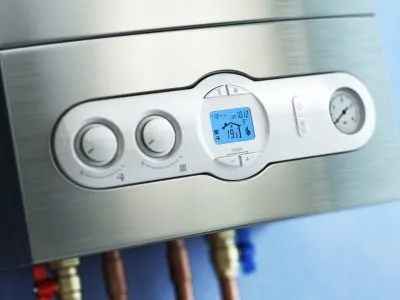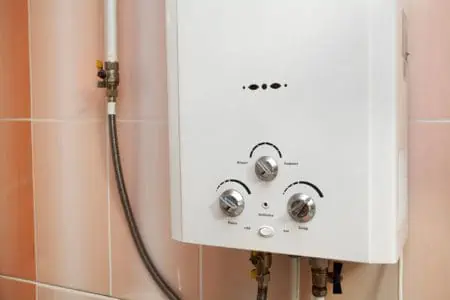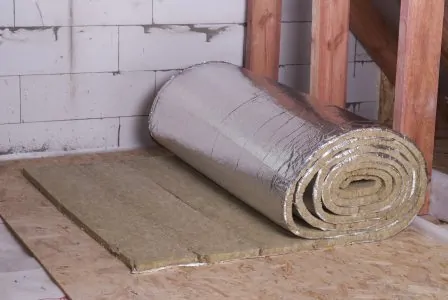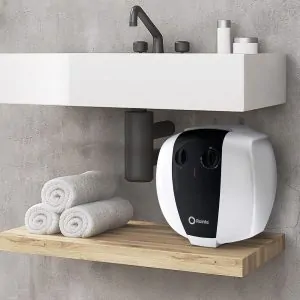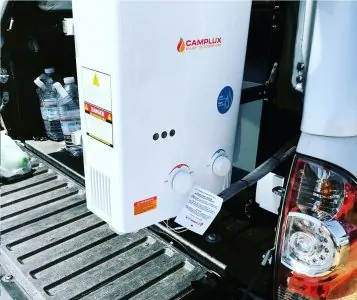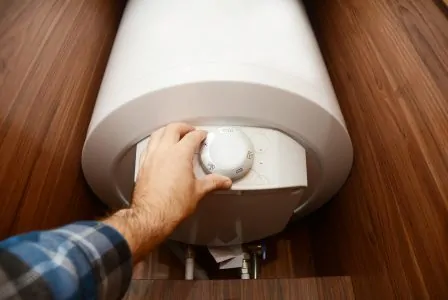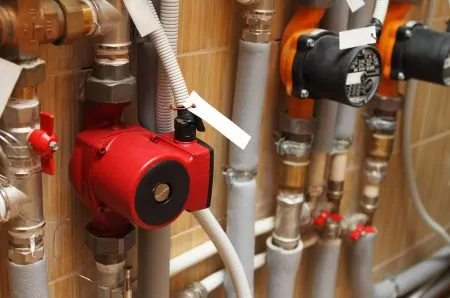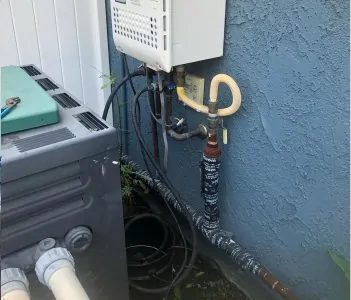Are you tired of wasting energy on your water heater when it isn’t needed? Do you want to increase your home’s energy efficiency, but you aren’t ready to replace your unit? If so, you should consider investing in a water heater timer.
Many households leave their water heater on 24 hours a day to ensure they always have hot water ready. However, this means water heaters account for an average of 18% of home energy use (1). A timer for your water heater can prevent this.
With so many water heater timers available, it can be difficult to know which type to choose. This article will explain why water heaters are useful and the different types you should consider.
Key Takeaways
- Water heater timers help save energy and money by controlling when your water heater is active.
- Timers are available for both gas and electric-powered water heaters.
- There are different types of timers, including box timers, programmable/digital timers, countdown timers, and Wi-Fi/Z-Wave timers.
- Water heater timers are best suited for larger households with consistent water usage patterns.
What Are Water Heater Timers?
A water heater timer is a device that allows you to set your heater to operate during specific “ON”/“OFF” periods. If you know you usually arrive home at 5 pm, you can set the timer and your unit will activate accordingly. This cuts down on energy waste, which will also trim your energy bill.
Water heater timers are available for both gas and electric-powered units. Although they require different fittings, they both use the basic concept of automatically turning your unit on and off.
How Efficient Are Modern/Old Water Heaters?
The efficiency of your water heater is greatly affected by how old it is and how much it has been used. Water heaters have a tendency to decrease in efficiency as they age. Once they reach their 15th or 20th year of service, they usually need to be replaced.
The difference between old and modern units in terms of efficiency is based on regulations. The energy efficiency of all water heaters is indicated by the energy factor (EF) of the specific unit (2).
In a conventional gas-powered, tank-type water heater, only about 50% of the fuel actually reaches the final point of supply. The rest is usually lost through standby losses, combustion, or distribution (3).
These energy standards have been updated to improve efficiency. Most modern models now include expensive efficiency-enhancing technology, but the downside is that this makes them more expensive to buy.
Modern units are designed in ways that reduce excessive heat loss. This improves their efficiency as they need less energy when providing hot water.
Are Timers Worth It?
Although a timer can’t increase your old unit’s energy factor, it can make your consumption more efficient. If you let your old water heater run all day, a lot of energy is wasted due to standby heat loss. You are repeatedly heating unused water.
A water heater timer will prevent this from happening. As you set it to only activate your unit during specific times, less energy is wasted on reheating.
Before rushing out to buy a timer, there are some things to keep in mind. While it might look like your water heater runs 24/7, it actually spends most of its time in “standby mode.”
In fact, an older electric water heater may only be active for three hours per day (4). Newer models with higher efficiency ratings are active for just half this time — some are in use for as little as half an hour.
Ultimately, this depends on an individual’s hot water habits. Large households will generally use more, while smaller homes use less. You can always improve your efficiency, but if you already only run your water heater for less than an hour per day, is it worth the extra effort?
How Much Money Can They Save?
In the average home, a water heater accounts for about 18% of the utility expenditure (5). If you live in a larger household or don’t have an energy-efficient unit, this number could be much higher. Much of this energy is lost due to standby heat loss.
If you are considering a timer primarily to save some cash, you can’t go wrong. A standard water heater will fill its tank with cold water and then heat it. Any unused water will remain inside the tank, where it gradually loses heat.
As the unit senses the decrease in temperature, it reactivates to keep the water hot. This means your unit continues to consume power even when you aren’t at home or using hot water. This isn’t such an issue with tankless heaters, which work on-demand.
A timer prevents unnecessary energy use by only activating the water heater during your set times. This will help you save money and energy, but the amount varies based on a few factors:
- The usual running costs of your unit.
- The type of water heater you have.
- Fuel type.
- Your hot water habits.
Some homeowners have found that their timer saved as much as 25% on their annual water heating costs.
Take Note
Tips for Buying a Timer
If you want to buy a timer, there isn’t much to consider other than the type and voltage.
Look for a device that’s compatible with the voltage of your water heater. For example, if your unit requires a 120-volt outlet, look for a timer that matches it.
The main factor to consider is which type of timer you want. There is a wide variety of water heater timers available for indoor and outdoor use. They range from a simple On/Off switch to a high-tech device that can be controlled via an app.
Each type has its own set of features and settings that you can choose from. Let’s take a closer look at some of the most common types.
1. Box Timers
Characterized by their boxlike appearance, these timers are probably the most recognizable. A box timer consists of either a digital control or a mechanical switch confined in a box.
These are popular, easy to use, and reliable. You can set them exactly as you need, right down to the day and hour for the coming week or month.
Box timers are recommended for households that have consistent hot water schedules. They are fairly easy to install and can cope with anything from 120 up to 270 volts.
2. Programmable/Digital Timers
Digital timers offer a bit more flexibility than box timers when it comes to programmable settings. They are a great fit for families that are eco-conscious and budget-minded. They can be given different settings for each day of the week — catering to changing hot water habits.
Digital timers usually come with a fitted LED control screen with a backlight that is very user-friendly. You can create preset times specifically modified to suit your own needs. For example, you can choose one time for the weekends when you’re home all day, and another for the weekdays when you’re home less.
They can be mounted on a wall of your choosing as they work remotely, but you will need additional wiring to connect them to your water heater. This means it’s usually best for a professional to perform the installation.
Some timers also allow you to connect them to your furnace or air conditioner unit. However, these are usually only for indoor use and will operate on a 110-volt outlet.
3. Countdown Timers
Countdown timers don’t offer as much flexibility as digital timers but are still useful. They function by counting down. For example, if you know you will need hot water in two hours, you can set it to a 60-minute countdown. After 60 minutes, it will start your water heater and you will have hot water for your shower.
Most countdown timers allow you to set them at preset intervals, generally ranging from 10 to 60 minutes. There is not much high-tech hardware involved with these. Some offer a digital display, but most have a standard mechanical dial.
You mount them on the wall, much like programmable timers. They don’t have to be right next to your water heater but will need additional wiring. This means calling in a professional for installation.
The main drawback of these is that they require some forethought, unlike programmable timers that you can set days in advance. With a countdown timer, you must anticipate when you will need hot water and then set it manually every time.
4. Wi-Fi and Z-Wave Timers
Wi-Fi and Z-wave timers offer the convenience of smart technology, meaning you can control everything from your phone. These usually work in two ways. You can use them to set a specific time or simply as an On/Off switch.
While they do come with a heftier price tag than other timers, you can use them to control several appliances around your home. These can include your garden lights, pool pumps, heaters, and of course, water heaters.
Most will include or recommend an app that you can download to your phone and control everything remotely. If you finish work early one day, simply connect to the timer via the app and turn on the unit so there’s hot water ready for you when you get home.
These timers are usually also are made from durable material, allowing for outdoor installation. Some models even let you monitor your energy use. This can help you improve your energy efficiency by giving you a clearer understanding of your habits.
5. Gas Water Heater Timers
Most water heater timers are designed for electric units. However, as gas-powered units generally rely on electricity to turn on and off, most timers will still work. You might even be able to find a suitable Wi-Fi or Z-wave timer.
Be sure to consult a professional to check whether or not your unit is compatible. Some gas-powered water heaters (usually older units) will require a special timer.
Check Before You Buy
How to Install a Timer
Installing a timer will vary depending on timer type and your water heater. Some timers only require a simple plug-in, such as the box timers. Other types, including programmable and high-tech timers, require complete rewiring.
This involves disconnecting the wires that enter the unit and connecting them to the timer. For this, we recommend that you consult a professional.
It’s pretty simple and straightforward to install a box timer, and you don’t need to be an experienced electrician. There should be a manual included with the device. If so, follow that and refer to our guide for additional support.
1. Shut off the Power
Before you touch any wires or electrical components, make sure you shut the power off completely. If you aren’t sure how to turn off your power, it might be best to call in a professional.
2. Select a Location
Select the best place to mount the timer. It should be in an accessible location, which will also make the installation easier. Place it so you can connect it to the water heater as well as the power source.
The best place is usually a wall close to the water heater. Decide on a spot and secure it with screws.
3. Double Check Power
Before you proceed to the next step, we recommend double-checking that the power is off. You can use a circuit tester to do this.
Remove the plate covering the power cable and check the wires for power. If there is none, continue to the next step.
4. Connect the Timer
Disconnect the main electrical cord leading to the water heater. On the timer, there should be a hole for the electrical cord to go through, sometimes called the “knockout” hole. Using a screwdriver or similar tool, give it a gentle tap to open it.
Pull the cord through and connect it to the timer. Next, grab a new electrical cable and connect one end of it to the timer through the second knockout hole. The other end of this cable routes back and connects to the water heater. Make sure it’s the same size and gauge as the existing cable.
Tighten the cable grip screws around the cords and continue to the next step.
5. Close and Turn On
Replace the plate on the water heater and timer. Then, find out how to set the timer and turn the power back on.
FAQs
In Summary
A water heater timer is a great investment for larger households with consistent water habits. They can help save on your monthly energy bill by controlling your unit’s operation to fit your needs. Simply set the times that you need hot water and it will automatically turn on your water heater.
However, they are not for everyone. They might not be worth the trouble in smaller households with three or fewer people, or if your heater is already rarely active.
